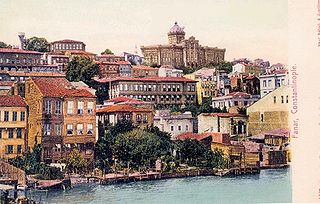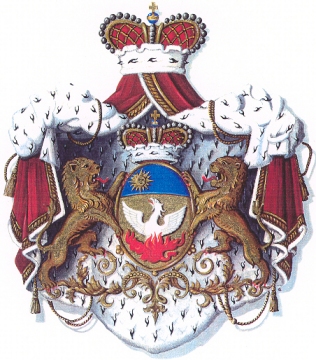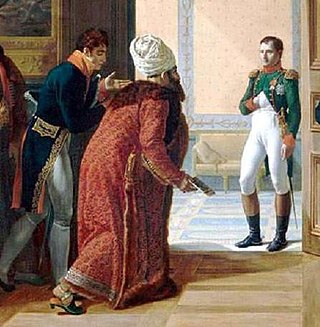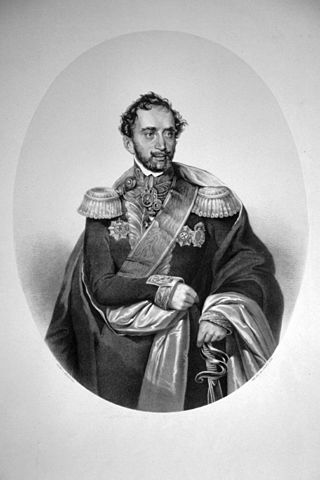
The House of Ghica [or Ghika] was a noble family whose members held significant positions in Wallachia, Moldavia and later in the Kingdom of Romania, between the 17th and 19th centuries. The Ghica family produced many voivodes of Wallachia and Moldavia and two Prime Ministers of Romania. Several branches of the family still exist today.

Phanariots, Phanariotes, or Fanariots were members of prominent Greek families in Phanar, the chief Greek quarter of Constantinople where the Ecumenical Patriarchate is located, who traditionally occupied four important positions in the Ottoman Empire: Voivode of Moldavia, Voivode of Wallachia, Grand Dragoman of the Porte and Grand Dragoman of the Fleet. Despite their cosmopolitanism and often-Western education, the Phanariots were aware of their Greek ancestry and culture; according to Nicholas Mavrocordatos' Philotheou Parerga, "We are a race completely Hellenic".

Constantine Demetrius Mourouzis, was a Phanariote Prince of Moldavia, and member of the Mourousis family. A remarkable polyglot, he spoke five languages: Greek, Latin, French, Arabic and Turkish.

The House of Mavrokordatos is the name of a family of Phanariot Greeks originally from Chios, a branch of which was distinguished in the history of the Ottoman Empire, Wallachia, Moldavia, and modern Greece.

A dragoman was an interpreter, translator, and official guide between Turkish-, Arabic-, and Persian-speaking countries and polities of the Middle East and European embassies, consulates, vice-consulates and trading posts. A dragoman had to have a knowledge of Arabic, Persian, Turkish, and European languages.

Greeks are a historic minority group in Romania. At times, as during the Phanariote era, this presence has amounted to hegemony; at other times, the Greeks have simply been one among the many ethnic minorities in Romania.

John George Caradja, also known by his regnal name Ioan Gheorghe Caragea, was a Phanariote Greek Prince of Wallachia, who reigned between August 1812 and September 1818. He was the second, and last, member of the Karatzas or Caradja family to ascend to the Wallachian throne, but one of several to have also held office as Great Dragoman of the Ottoman Empire. Caradja, whose life is relatively obscure up to that point, held two terms as Dragoman. Before 1800, he also embarked on a literary career, participating in the spread of Enlightenment literature throughout the Rum Millet, and becoming noted for his translations from Carlo Goldoni. His progeny included Rallou Karatza-Argyropoulos, who was famous in her own right as a pioneer of modern Greek theater.

The House of Mourouzis or Moruzi is the name of an old and distinguished noble family which was first mentioned in the Empire of Trebizond, whose members later occupied many important positions within Ottoman Empire, Wallachia, Moldavia, Russian Empire and Romania.

Constantine Hangerli, also written as Constantin Hangerliu, was a Prince of Wallachia between 1797 and the time of his death. He was the brother of Alexander Hangerli, who served as Prince of Moldavia in 1807.

Alexandru Dimitrie Ghica, a member of the Ghica family, was Prince of Wallachia from April 1834 to 7 October 1842 and later caimacam (regent) from July 1856 to October 1858.

Alexander Hangerli or Handjeri, was a Dragoman of the Porte of the Ottoman Empire, and Prince of Moldavia between March 7 and July 24, 1807. He spent the latter part of his life as a refugee in the Russian Empire, where he became noted as a linguist. He was the brother of Constantine Hangerli, who reigned as Prince of Wallachia before being executed in 1799.

John Theodore Callimachi was Prince of Moldavia from 1758 to 1761.
The École des Jeunes de langues was a language school founded by Jean-Baptiste Colbert in 1669 to train interpreters and translators in the languages of the Levant for ancien regime France. It systematized such training activity, which had begun informally at the Collège des trois langues; the latter had been created in 1530 by Francis I of France on the initiative of Henry IV's widow, Marie de Medici, to offer a course in Arabic.
Nicholas Caradja was a Phanariote Prince of Wallachia, who reigned between 15 January 1782 and 17 July 1783.

Alexandru Papadopol-Calimah was a Moldavian-born Romanian historian, jurist, and journalist, who served as the Minister of Foreign Affairs and Minister of Culture of the Principality of Romania. As a maternal member of the Callimachi family, he had high aristocratic origins, but was a commoner on his father's side; he spent most of his life in the Moldavian town of Tecuci, whose history was a focus of his academic activity. He joined the Moldavian civil service in 1855, as a Spatharios in service to Prince Grigore Alexandru Ghica, and participated in applying Ghica's reforms. Papadopol-Calimah consequently discarded his Greek-and-Hellenized background to become an exponent of Romanian nationalism, supporting a political unification between Moldavia and Wallachia, which came about in 1859. He first served in the unified administration established by Domnitor Alexandru Ioan Cuza, rising from Prefect to State Council member, then to cabinet minister. Throughout his career, he remained closely aligned with Vasile Alecsandri and Mihail Kogălniceanu, and later also with Bogdan Petriceicu Hasdeu.

Nicholas Mavrocordatos was a Greek member of the Mavrocordatos family, Grand Dragoman to the Divan (1697), and consequently the first Phanariote Hospodar of the Danubian Principalities, Prince of Moldavia, and Prince of Wallachia. He was succeeded as Grand Dragoman (1709) by his brother John Mavrocordato (Ioan), who was for a short while hospodar in both Wallachia and Moldavia.

Saint Nicholas Princely Church is a Romanian Orthodox church located at 65 Anastasie Panu Street in Iași, Romania. It is dedicated to Saint Nicholas.

The Dragoman of the Sublime Porte, Dragoman of the Imperial Council, or simply Grand or Chief Dragoman, was the senior interpreter of the Ottoman government and de facto deputy foreign minister. From the position's inception in 1661 until the outbreak of the Greek Revolution in 1821, the office was occupied by Phanariotes, and was one of the main pillars of Phanariote power in the Ottoman Empire.

Gregory Callimachi was a Phanariote who served as Prince of Moldavia from 1761 to 1764, and 1767 to 1769.

Alexander (II) Mavrocordatos, surnamed Firaris (Φιραρής) was a Phanariote who served as Prince of Moldavia from 1785 to 1786.

















